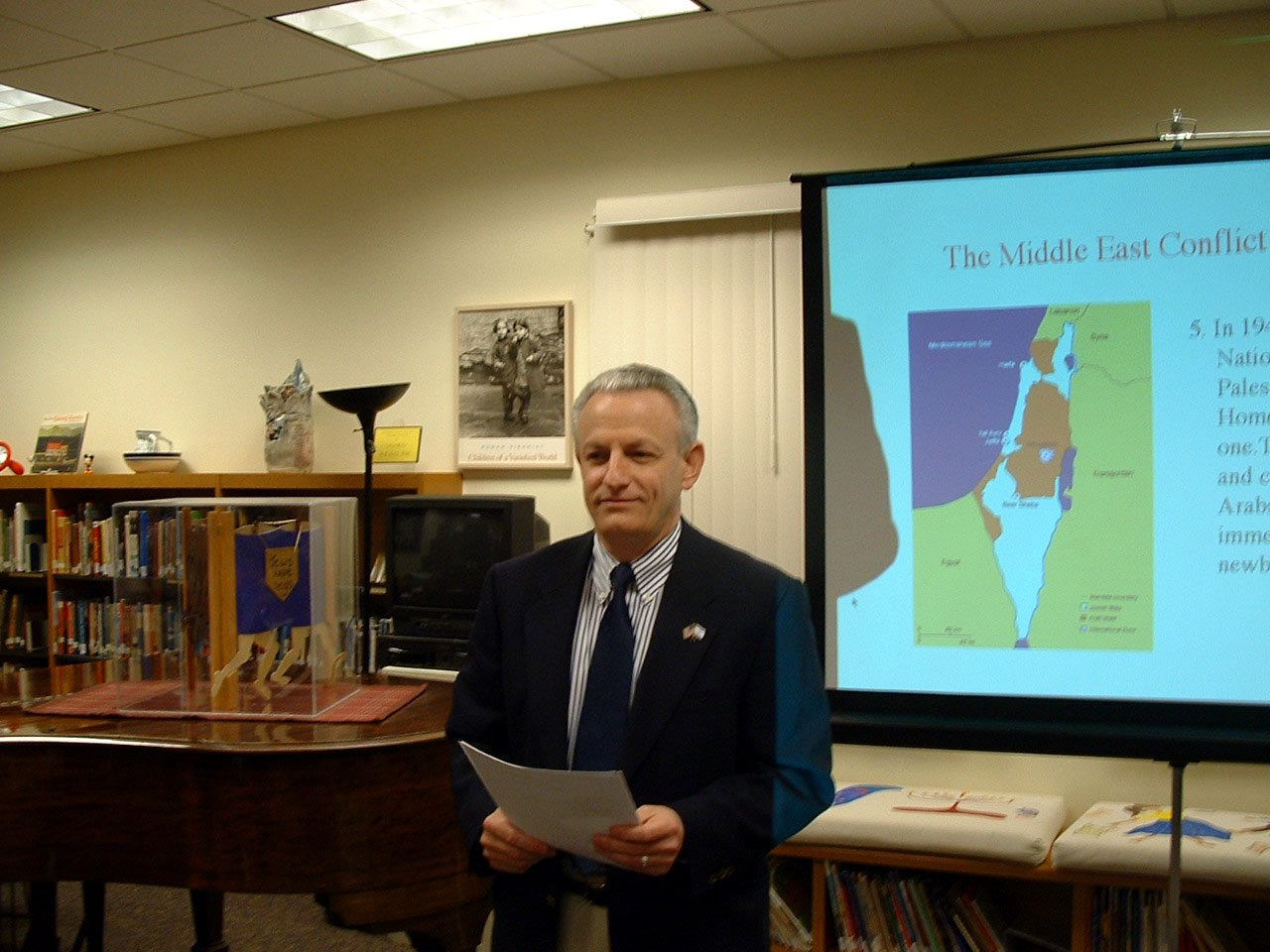|
By
Joel A. Moskowitz, M.D
The first in a series of three talks on Israel featured
speaker, J.J. Surbeck, Chair of "Stand With Israel." a committee
of Congregation Beth Israel, La Jolla. The event drew an overflow crowd to
the Astor Library at Lawrence Family Jewish Community Center on Monday, Jan. 30.
Surbeck's background includes having been an international lawyer long
affiliated with the International Red Cross, which organization he admits wryly,
is no friend of Israel. This first talk, "The Middle East
Conflict - A Primer" aimed to provide historical ammunition as a defense
against critics of the State of Israel. Many, Surbeck said, admit
privately they don't "know the facts."
Israel is much smaller than the press attention would suggest. Its
North-South dimension would be as little as the driving distance from San Diego
to San Francisco. Compared in size to New Hampshire, this relatively tiny
territory has been terrorized through the ages by a series
of invaders. Babylonians, Romans, Byzantines, Persians, Arabs, Crusaders,
Ottoman-Turks and eventually British all ruled in this region.

J.J. Surbeck lectures in Astor Library at Lawrence Family
Jewish Community Center
Surbeck stressed that throughout the centuries, Jewish presence continued.
Sam
Harris, noted author, has addressed this subject saying each of the faiths would
have the world believe that G-d was their real estate broker and deeded the land
to them. The United Nations created the State of Israel in 1947.
Over the next decades, surrounding Arab nations attempted to destroy the ancient
Jewish homeland. The Yom Kippur sneak attack (1973) was a close call
but Israel survived. Since then, Arab tactics have shifted from State
identified military misadventures to targeting civilians with terror in the form
of murder/suicide bombers. Disinformation programs designed
to paint Israel as an aggressor-occupying nation obscenely label Israel a Nazi
state. Paradoxically, many of these utterings eminate from Arab countries
that themselves lack any semblance of democratic government and have unelected,
dictatorial leaders who control their populace with totalitarian methods.
Arab citizens have more rights in Israel than they
do in other Islamic countries, Iran for example.
The first "Intifada" (translating literally to refer to shaking off,
of the Israeli control): From 1987 to 1993, the Palestine Liberation
Organization neglecting to admit to the abuse of their own children sought to
mislead the public by charging Israel with brutality.Subeck detailed the many
efforts that Israel extended to come to peace with its Palestinian neighbors:
1991 - Madrid Peace Conference; 1993 - Oslo Accords; the Wye River Agreement;
President Clinton's Camp David efforts at which then Prime Minister Ehud Barak
made huge concessions. Arafat changed the
name of his organization to The Palestinian Authority (another linguistic
deception - there was no opportunity for Palestinians to elect other officials
until recently with
the choice of Hamas). Arafat who never missed an opportunity to miss an
opportunity (said by Aba Eban years prior) in 2000 launched the second Intifada.
By 2002, the Quartet, consisting of
the United States, the European Union, Russia and the United Nations crafted
" the Road Map".
Having sustained over 500 deaths by suicide bombers, Israel decided to build a
physical barrier, criticized as being a "wall" (only 5% is actually a
wall) but it is a fence. Note that the United States has a barrier between
the U.S. and Mexico and Saudi Arabia has built a wall to
exclude Yemenites but Israel's image is invariably portrayed as being the sole
"wicked" country.
On reflection, it is not altogether surprising that many Palestinians have been
disillusioned by the failure of the Palestinian Authority to improve their lot.
Corruption, misappropriation of the billions of dollars given to them by the
U.S. and others have not remedied their economy. Hamas, while dedicated to
the destruction of Israel, has attended to advancing the well being of the
average Palestinian. Schools, albeit designed to inculcate hate of Israel,
offer promise. Health and other social service programs are appealing to
the embittered and long rejected Palestinians.
Surbeck doesn't believe that Hamas as a political force is an absolute
catastrophe. Preferring to talk about economic zones rather than borders,
there are, says Surbeck, "seeds of hope."
The coming months will be revealing. Will Hamas renounce terrorism; accept
the permanence of Israel as a peaceful neighbor; become a democratic
modern Islamic state or a fundamentalist repressive country - a satellite of
Iran? Unlikely to be threatened by withholding of U.S. $400
million aid, Hamas can readily enlist economic assistance by appealing to like
thinking Islamic friends. Egypt which has a "peaceful"
relationship with Israel remains virulently anti-Israel despite the $2-3 billion
placating from the United States.
Many problems remain. Surbeck believes that it has been beneficial to have the
United States' decide to invade Iraq and remove an evil foe, Saddam Hussein.
Iran's nuclear threat is worrisome. The remarks of the Iranian President
against Israel may have alerted the world that he is another Hitler.
Europeans, Surbeck fears, "lack spine" as evidenced by their
silence about the atrocities in Serbia. More recently Jacque Chirac, fed
up with Iranian deception, has declared that France could retaliate. Tactical
planning is required should Israeli or other forces decide to eliminate Iran's
nuclear weapon capability. It will not be as easy as the
prior Israeli bombing of the Iraqi single plant.
Ending on a hopeful note to the myriad questions posed by those who attended his
talk,Surbeck indicated that in the U.N. Ambassador John Bolton is leading a
charge to close the United Nations as a site for pro- Palestinian propaganda.
|

